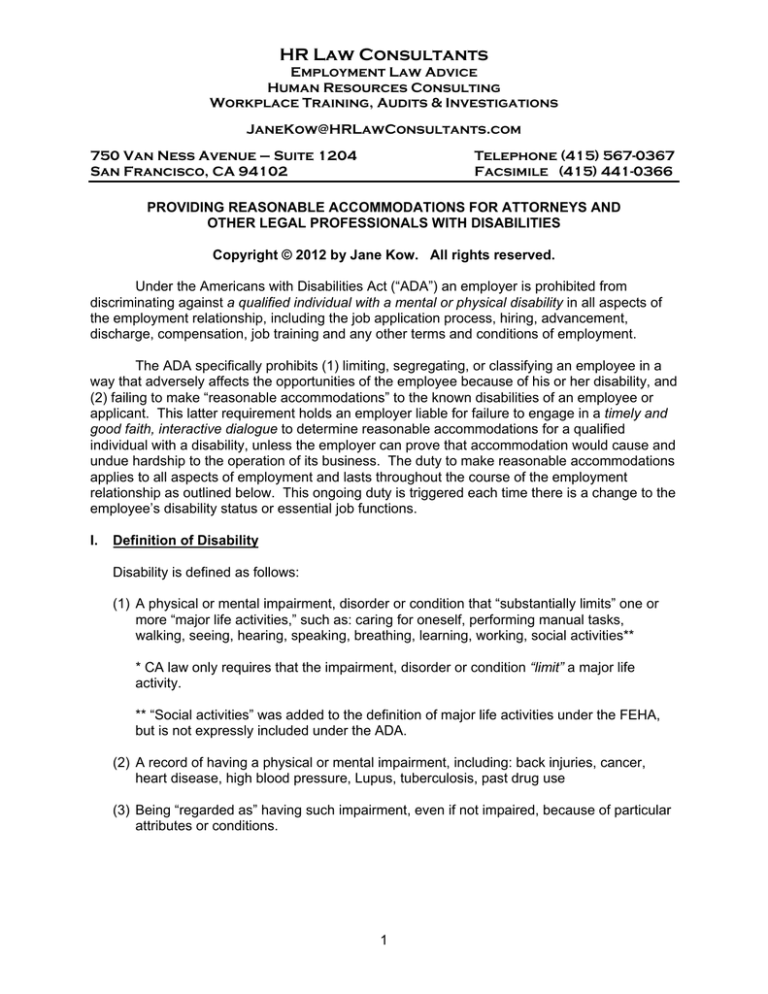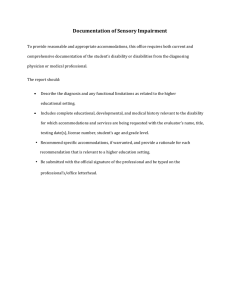
HR Law Consultants
Employment Law Advice
Human Resources Consulting
Workplace Training, Audits & Investigations
JaneKow@HRLawConsultants.com
750 Van Ness Avenue – Suite 1204
San Francisco, CA 94102
Telephone (415) 567-0367
Facsimile (415) 441-0366
PROVIDING REASONABLE ACCOMMODATIONS FOR ATTORNEYS AND
OTHER LEGAL PROFESSIONALS WITH DISABILITIES
Copyright © 2012 by Jane Kow. All rights reserved.
Under the Americans with Disabilities Act (“ADA”) an employer is prohibited from
discriminating against a qualified individual with a mental or physical disability in all aspects of
the employment relationship, including the job application process, hiring, advancement,
discharge, compensation, job training and any other terms and conditions of employment.
The ADA specifically prohibits (1) limiting, segregating, or classifying an employee in a
way that adversely affects the opportunities of the employee because of his or her disability, and
(2) failing to make “reasonable accommodations” to the known disabilities of an employee or
applicant. This latter requirement holds an employer liable for failure to engage in a timely and
good faith, interactive dialogue to determine reasonable accommodations for a qualified
individual with a disability, unless the employer can prove that accommodation would cause and
undue hardship to the operation of its business. The duty to make reasonable accommodations
applies to all aspects of employment and lasts throughout the course of the employment
relationship as outlined below. This ongoing duty is triggered each time there is a change to the
employee’s disability status or essential job functions.
I.
Definition of Disability
Disability is defined as follows:
(1) A physical or mental impairment, disorder or condition that “substantially limits” one or
more “major life activities,” such as: caring for oneself, performing manual tasks,
walking, seeing, hearing, speaking, breathing, learning, working, social activities**
* CA law only requires that the impairment, disorder or condition “limit” a major life
activity.
** “Social activities” was added to the definition of major life activities under the FEHA,
but is not expressly included under the ADA.
(2) A record of having a physical or mental impairment, including: back injuries, cancer,
heart disease, high blood pressure, Lupus, tuberculosis, past drug use
(3) Being “regarded as” having such impairment, even if not impaired, because of particular
attributes or conditions.
1
HR Law Consultants
Employment Law Advice
Human Resources Consulting
Workplace Training, Audits & Investigations
JaneKow@HRLawConsultants.com
750 Van Ness Avenue – Suite 1204
San Francisco, CA 94102
Telephone (415) 567-0367
Facsimile (415) 441-0366
II. Definition of Disability - A physical or mental impairment, disorder or condition means:
(1) Any physiological disorder, or condition, cosmetic disfigurement, or anatomical loss
affecting one or more major body systems. (Under CA law, this definition expressly
includes chronic or episodic conditions such as HIV/AIDS, hepatitis, epilepsy, seizure
disorder, diabetes, multiple sclerosis, and heart disease.)
(2) Any mental or psychological disorder, including mental retardation, organic brain
syndrome, emotional or mental illness, and learning disabilities. (CA law expressly
includes clinical depression and bipolar disorder.)
III. Who is a “qualified individual with a disability”?
The ADA only covers a “qualified individual with a disability,” who can perform all of the
essential functions of a position, with or without reasonable accommodations. Therefore, the
employer need not make a reasonable accommodation for a person who is not “otherwise
qualified” or who does not satisfy all the skill, experience, education, and other job-related
requirements of the position held or applied for. If the individual cannot perform the essential
job functions even with accommodations, then the person is not considered “qualified” under the
ADA.
IV. What is the employer’s duty to provide reasonable accommodation?
The duty to provide “reasonable accommodation” is based upon the recognition that a
“qualified individual with a disability” may need accommodations to receive equal opportunities
in all phases of the employment relationship. Therefore, employers are required to engage in
an interactive dialogue with an employee or applicant to determine what, if any, form of
reasonable accommodation may be necessary. This is an on-going process and the specific
accommodation may change as an employee’s job duties or condition changes.
Whether something would constitute a “reasonable accommodation” must be assessed
on a case-by-case basis, and often involves a fact intensive inquiry into (1) the individual’s
ability to perform the essential functions of his or her particular job, (2) the individual’s functional
limitations/work restrictions, and (3) what form of reasonable accommodations are appropriate
under the circumstances.
2
HR Law Consultants
Employment Law Advice
Human Resources Consulting
Workplace Training, Audits & Investigations
JaneKow@HRLawConsultants.com
750 Van Ness Avenue – Suite 1204
San Francisco, CA 94102
Telephone (415) 567-0367
Facsimile (415) 441-0366
OUTLINE OF INTERACTIVE PROCESS TO DETERMINE
REASONABLE ACCOMMODATIONS FOR INDIVIDUALS WITH DISABILITIES
I.
What triggers the employer’s duty to engage in a timely, good faith interactive dialogue?
A. As soon as HR or a manager is on notice of an individual’s disability and need for
accommodations
B. At the request of the employee or applicant for assistance or corrective measures
related to a mental or physical impairment
C. HR or manager observes employee with obvious disability having difficulty performing
essential job functions
II. Form of the request
A. Can be informal verbal request-- no need for employee to put it in writing, use *magic
words* or state “I have a disability” or “I need an accommodation” in order for duty to be
triggered.
B. Request can come from employee directly or from employee’s doctor, family member,
etc.
III. When is the interactive process not triggered?
A. The employer has no knowledge and has no reason to know that individual has a
disability.
B. Applicant or employee is not qualified for the position— does not possess the necessary
skills, experience, or educational background or meet other job-related requirements.
C. Employee is currently engaged in the use of illegal drugs or drinking on the job.
D. Employee poses a direct threat to the health and safety of others in the workplace,
including engaging in threats of violence in the workplace.
IV. Engaging In The Interactive Process To Determine Effective Reasonable
Accommodations
A. Meet with the individual who discloses a disability or requests an accommodation in a
timely manner, to identify the individual’s job-related limitations and work restrictions,
and physical or functional capacities.
1. Assess individual’s work restrictions and ability to perform essential job
functions, but avoid inquiring about diagnosis or genetic predisposition to the
disease, disorder or condition, which can be protected by a right to medical
privacy under the ADA and the Genetic Information Non-Discrimination Act
(GINA).
What accommodations will you need to perform the essential job functions?
What accommodations did your last employer make?
What kind of equipment would you need to enable you to perform the job duties
(e.g., use the computer, take depositions, etc.)?
3
HR Law Consultants
Employment Law Advice
Human Resources Consulting
Workplace Training, Audits & Investigations
JaneKow@HRLawConsultants.com
750 Van Ness Avenue – Suite 1204
San Francisco, CA 94102
Telephone (415) 567-0367
Facsimile (415) 441-0366
What structural changes can be made to give you full access to your
workstation?
2. Discuss possible accommodations with applicants:
Holding interviews at fully accessible locations
Making any pre-employment tests available in alternative means (e.g., Braille)
Allowing blind applicants to submit application information orally
Making a sign interpreter available for a person with a hearing impairment
3. If disability is not obvious, can request that employee (and health care provider)
complete a Request for Reasonable Accommodations Form which provides
information about the employee’s medical restrictions and functional capabilities. If
an employee refuses to provide medical documentation of disability and need for
accommodation, the employer should document such refusal and explain that the
employee has an obligation to provide medical certification regarding his or her
functional capabilities and work-related limitations to support need for an
accommodation. Failure to provide requested information may result in denial of
reasonable accommodations.
B. Analyze the job and determine which functions are essential v. non-essential and
consider reassignment of non-essential job functions. The accommodation should
enable the employee to perform all essential job functions. Consider the following
factors:
1. Review job description for essential functions.
2. Does the position exist in order to perform this function? (e.g., essential functions of
a trial attorney position is to be able to prepare trial briefs, make oral arguments,
cross examine witnesses, etc., which are different from those of a transactional
lawyer who might negotiate deals and never have to set foot in a courtroom)
3. Is the function highly specialized so that only those with particular expertise or skill
can perform the function?
4. Are there only a limited number of employees who can perform the same function?
5. Is a lot of time per shift spent on performing this function? (although this alone is not
dispositive, e.g., litigators may not frequently go to trial, but the ability to handle a trial
would still be an essential function)
6. Can the function be modified or reassigned to another employee without significant
work disruption? (If it would not be possible within a smaller firm to reassign an
attorney’s trials to other attorneys within the firm who have their own caseloads,
without significant work disruption and undue burden on staff, then it might not be
feasible or could constitute an undue hardship)
7. Do performance reviews refer to the importance of performing the particular job
function?
C. Consider “A Menu Of Possible Options” In Determining Reasonable Accommodations.
1. Document what employee believes that he or she needs in order to perform essential
functions of the job and discuss alternatives when a given request seems too
burdensome
4
HR Law Consultants
Employment Law Advice
Human Resources Consulting
Workplace Training, Audits & Investigations
JaneKow@HRLawConsultants.com
750 Van Ness Avenue – Suite 1204
San Francisco, CA 94102
Telephone (415) 567-0367
Facsimile (415) 441-0366
2. Consider possible accommodations, including:
Restructuring a job by assigning marginal (nonessential) job functions to other
employees
Transfer to an open position for which the employee is qualified
Providing a part-time or modified work schedule or flexible work hours
Providing a leave of absence
Ergonomic adjustments or modifications to work station or equipment
Removing physical barriers to allow full access to worksite (e.g., widening a
doorway and installing ramp)
Providing assistive devices (e.g. phone amplifiers, screen readers and
magnification software for visually impaired, etc.)
Modification of training materials and policies so that they are available on
audiotape or in Braille
Telecommuting arrangement
D. Evaluate the effectiveness of proposed accommodations and their impact on overall
resources and operational needs of business
1. Evaluate whether each proposed accommodation will enable the employee to
perform the essential job functions
2. If the request for accommodation is burdensome, consider whether the proposed
accommodation will actually cause an “undue hardship” to a particular office or the
law firm or company as a whole:
Is it unduly costly - what is the effect of the accommodation on the employer’s
expenses and resources?
Is it too time consuming to implement?
Does it substantially modify the essential job functions?
Is it disruptive to the workflow or others’ ability to perform their jobs duties?
Does it fundamentally alter the nature or operation of the business?
E. Implement the accommodation that will enable employee to perform all essential job
functions and appropriate for employer’s business
F. Review the progress of the accommodation periodically to determine whether
accommodation is effective. If accommodation is not effective or is no longer effective,
then employer must continue to engage in the interactive process to identify alternative
accommodations
G. Watch out for retaliation and harassment
1. Penalizing employee for requesting or receiving an accommodation (e.g., disciplining
employee for poor attendance after granting a flexible work schedule or time off for
medical treatment; or making employee work harder after returning from a leave of
absence to “make up” for lost productivity and billable hours)
5




